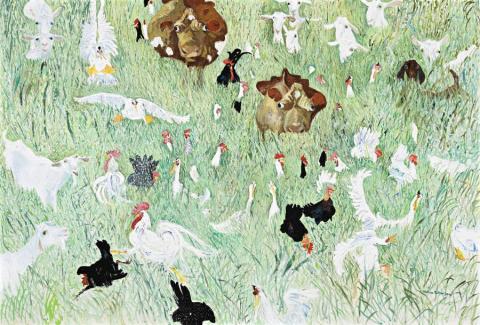BIRKDALE FARM, 1980
WILLIAM ROBINSON
oil on canvas
131.0 x 193.0 cm
signed lower right: William Robinson
Ray Hughes Gallery, Brisbane
Private collection
Christie's, Melbourne, 1 May 2000, lot 126
Galleries Schubert, Queensland (label attached verso)
Deutscher~Menzies, Melbourne, 4 June 2003, lot 24
Private collection, Queensland
Robinson farmyards, as they are commonly known, are extremely important in the development of his work. Not simply because they belong to a fascinating and interesting period in themselves, but because these paintings are central to Robinson's reconfiguring of the Australian landscape.
Robinson's early domestic interiors, with their backdrop of daily family life, provided glimpses of the outdoors through windows or open doors. These domestic works were painted in homage to Pierre Bonnard and allowed Robinson to hone his skill as a colourist. As Robinson's painting developed, his attention moved out of the interior, paused for a short period on the Queensland veranda and then made its way through the garden and into Bill and Shirley's hobby farm. Populated by cows, goats and poultry that were probably closer to family pets than anything else, they became Robinson's subject.
In his own words, Robinson's depictions give 'some feeling of the relationship of man to domestic animals and also the relationship that exists within the world of these animals. It reveals something of the individuality with which a farmer treats each animal. Each has a name and a personality and the picture gives a series of portraits.'1
It was here that Robinson began to experiment with space in a structural manner - rather than through colour, as he had done previously through the prism of his admiration for Bonnard. So the results are fascinating because the developments in Robinson's work are disguised by the whimsical nature of his subject.
In Birkdale Farm, 1980 for example there is no horizon, the whole scene tilted upwards as with Cézanne's table top. Indeed if you look at the cows, which in a nod to cubism are probably the same cow, named Josephine, you notice that there is no perspective either, as the cow further away appears to be the larger of the two.
Up until this point Robinson had been a reasonably conventional painter, but by now he is 44 years of age and challenging the very conventions he himself has taught for two decades. The poultry in Birkdale Farm are in a fluster, the rooster poses and postures unsure of what is going on and the ducks race around not knowing quite where they should be. In short, the scene is anarchic. This anarchy in the farmyard gave way to some of the most profoundly beautiful paintings and one of the most interesting painters that Australia has produced.
1. William Robinson in conversation to the Gold Coast City Art Gallery, 1998, quoted in Walsh, J., 'Goats, Cows and Chooks: The Painters Farmyard', in Seear, L. (ed.), Darkness and Light: The Art of William Robinson, Queensland Art Gallery, Brisbane, 2001, p. 72
HENRY MULHOLLAND
